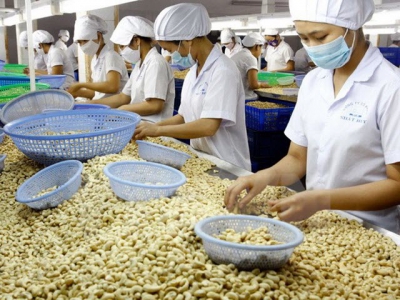Viet Nam aims to become global agriculture powerhouse

HÀ NỘI — Việt Nam is pursuing an ambitious plan to become a global agricultural powerhouse by 2030, according to Government Resolution 53/NQ-CP.
Workers process peanuts at Nhất Huy JSC in Đà Nẵng. — Photo nongsan
The resolution stipulates that Việt Nam must aim to rank among the world’s top 15 most developed agricultural countries and a global hub for agricultural logistics and processing.
In order to realise these goals, a number of strategic objectives must be fulfilled, said Minister of Agriculture and Rural Development Nguyễn Xuân Cường.
Firstly, Việt Nam must restructure its agriculture sector with nationwide planning to establish input material producing regions and consumption markets. High-producing regions with skilled labour forces and developed infrastructure and logistics networks should be earmarked for investment to serve as growth drivers for surrounding localities.
The country’s agro-processing sector must start filtering out products with low add-value and seek ways to add more value to existing products.
Secondly, the business environment must continue to improve to help facilitate investment, especially in the country’s agriculture, forestry and aquaculture sectors. The country must also build a long-term development strategy to fully exploit areas where it enjoys significant advantages such as vegetable farming, aquaculture and wood processing to attract more investment.
Meanwhile, administrative reforms must target unnecessary business requirements and conditions and build legal frameworks to help localities unleash their potential. For instances, farmland could be rented from farmers and merged to allow greater economies of scale and higher degree of product specialisation.
Thirdly, the country must seek to improve its products to compete by supporting the formation of large enterprises specialised in agriculture, forestry and aquaculture. Measures must also be taken to help farmers sell their products directly to domestic consumers.
Additional investment must go into the development of national brands, especially for products that have been widely-recognised in the international markets such as tra fish, shrimp, coffee, pepper and ginseng.
The country must also look to adopt advanced technology to add more value to its products, improve safety and enforce product origin regulations.
Lastly, Việt Nam will need significant investment in human resources to spearhead the growth in its agricultural sector. A new generation of workers who can use technological advances will play a key role in connecting producers to consumers to achieve greater market efficiency.
Meanwhile, the Government must seek ways to encourage the private sector to invest in production, especially in research and development. A national database to oversee production, logistics and processing activities is also listed as a top priority for agriculture agencies. Việt Nam must focus on improving national standards to govern agriculture activities and product quality.
According to the Organisation for Economic Co-operation and Development, demand for agricultural products had been on the rise on a global scale and was forecast to continue to rise.
Viêt Nam is well-poised to take advantage as a signatory to trade deals such as the Comprehensive and Progressive Trans-Pacific Partnership and the EU-Vietnam Free Trade Agreement.
Related news
 Pepper price to remain low this year
Pepper price to remain low this year Pepper prices this year are unlikely to recover after a strong reduction in 2019 due to abundant supply.
 Businesses crucial to future development of agricultural sector
Businesses crucial to future development of agricultural sector Strong participation among domestic businesses in the agricultural field has proved that the sector is full of promise whilst enjoying a number of advantages
 Agriculture under digital era
Agriculture under digital era In the past, the agriculture was attached to the image of a farmer working hard on the fields. Nowadays, the technology application helps renovate the productio